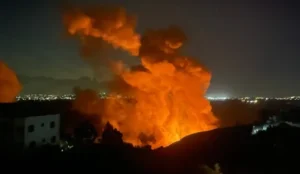This Time Netanyahu Can’t Be Blamed

Israeli strike in southern LebanonCredit: AFP
This time, we can’t blame Benjamin Netanyahu. The prime minister was boarding a plane for another pointless speech at the UN after approving the Macron-Biden agreement for a temporary cease-fire in the north, and then his advisers informed him that a large majority of the public is against this.
This included the mainstream media; military correspondents and commentators, who usually attack him for every misplaced hair; opposition lawmakers; and even the head of the left Zionist party, Yair Golan, who announced that “we must not agree to a three-week a priori cease-fire.”
Netanyahu didn’t have to wait for National Security Minister Itamar Ben-Gvir’s usual threat to quit the government if such a deal were signed. A decisive majority of the Israeli public would have gone nuts. What? A cease-fire now, when we’re on the verge of wiping out Hezbollah?
Behold, the Israel Defense Forces officially declared the death of Hezbollah Secretary-General Hassan Nasrallah and we’re at the climax of the movie about the army’s awesome operations, which has been playing for a week already: the precise intelligence, the exploding pagers. And the enemy’s balls – there’s no pleasant way of saying it – have been ripped off.
That is an important point. It has a compensatory symbolic depth. After the massacre on October 7, Israeli male pride was crushed. Nothing could erase that burning humiliation. Hamas, whose capabilities were underestimated, was able to build an army and commit a massacre undisturbed. The last few days in Lebanon and the liquidation of Nasrallah have restored our fragile masculinity and no one will let this be taken away.
Netanyahu is already seeing dividends in the polls. His numbers are improving. And truth be told, no prime minister would go against such broad public sentiment, the opposition from coalition members and the opposition from those flanking him from the right – especially not Netanyahu.
The people are demanding an escalation in the north and a general regional war, because a war against Hezbollah – both for Netanyahu and the army brass, and especially for the public – is a continuation of the war of the past year.
We just copied the same stupidity, short-sightedness and the reservists’ thirst for revenge and attrition to another border. Once again we’re falling into the trap Hamas leader Yahya Sinwar laid at the start of the war, but this one is just a few dozen kilometers to the north.
The defense establishment has debated the advantage of killing senior officials for years. One of the usual arguments raised against such moves was the killing of Hezbollah Secretary-General Abbas Musawi in 1992, which resulted in his replacement by Hassan Nasrallah, who turned out to be a more dangerous enemy. On top of this, Israel was punished with a number of deadly attacks.
On the other hand, there are many strong arguments against a cease-fire at this time, for example that this is an opportunity to strike an enemy that threatens the country from the north and dismantle the Iranian “ring of fire.” But these arguments are based on the assumption that the government will know the right moment to reap the profits and get out.
There is no reason to believe that this government has this ability. From the moment it was established, it hasn’t known when to stop any destructive processes in time, from the ambition to carry out the judicial coup to blocking Hamas’ elite Nukhba force in the Gaza border communities, from the repeated warnings about the deteriorating economy to Israel’s latest credit downgrade because “there is no visibility on an exit strategy from the military conflict that would restore a level of certainty and security, on which the economy and business investment ultimately rely,” as Moody’s wrote.
At this early stage, it’s impossible to predict what will happen in the wake of the bombing in Dahiyeh and the liquidation of Nasrallah, but one thing is certain: If this government is dictating the reality, it will end badly. Meanwhile, Netanyahu’s forever war project is continuing undisturbed. The October 7 massacre happened, the hostages are dying in the tunnels, and the Netanyahu theater is trying to erase the memory of the disaster.
This article is reproduced in its entirety.
